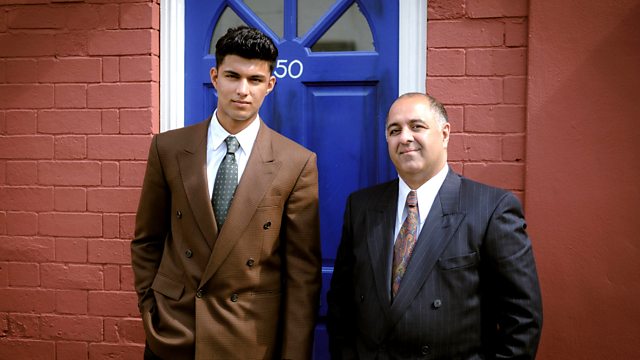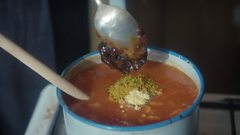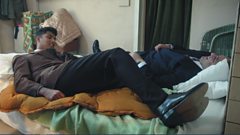Episode 1
The Sharma family experience life as a South Asian family in 50s Britain, from hard factory shifts to adapting their cooking to suit local ingredients. Liver curry anyone?
This series sees the Sharma family go back in time to discover what life was like for families who came from South Asia to settle in Britain from the 1950s onwards. The city of Birmingham is now home to more than 250,000 people of Indian, Pakistani, Bangladeshi or Sri Lankan descent. Based here, the family experiences first-hand how their parents’ and grandparents’ generations made new lives for themselves in the city - from arriving in postwar Britain to the 21st century. This includes the jobs these new arrivals did, the homes they lived in and how they entertained themselves, as well as the impact of changing immigration policies on ordinary families. The Sharmas discover how the experiences of this pioneer generation have influenced not just their own lives but have helped shape the modern multicultural Britain of today.
Guiding the Sharmas on their journey are ����ý Asian Network’s DJ-turned-presenter Noreen Khan and historian Yasmin Khan, whose own family members both migrated from Pakistan in the latter half of the 20th century.
The Sharmas, whose family are Hindu and originally came from India and Uganda, are living in Sparkbrook. Now a predominantly Muslim/Pakistani suburb of Birmingham, in 1950 it was one of a handful of neighbourhoods in the city where new arrivals from across the subcontinent and of all faiths began to settle. Father Vishal and 19-year-old son Akash arrive first and are shocked at the accommodation available in 1950 - a dingy room with a bed they must share on a rota, and access to a basic kitchen and bathroom. While Vishal puts in a shift at one of Birmingham’s many factories, Akash’s limited culinary skills are put to the test by a 1950s larder, from which he whips up dinner for his dad and two guests, Pravin and Saleem – themselves economic migrants who both lived in shared accommodation when they first arrived.
Early migrants had mostly intended to return home, but as the work continued some made the decision to stay, sending for their wives and daughters. Mum Manisha and 20-year-old Alisha join the men at their lodgings, bringing home comforts and vital kitchen equipment. By the mid-50s, enterprising locals were starting to import kitchen staples such as atta, spices and lentils wholesale. So, although it might have involved a long trek to specialist cash-and-carries, food started to resemble what they were used to at home.
Noreen visits to introduce Manisha and Alisha to their new jobs – sewing buttons on shirts, for which they would be paid a pittance per shirt completed. With these home-based roles came the difficulty of isolation. Noreen, Manisha and Alisha experience how being left in only the company of other South Asian women meant many first-generation women didn’t get the opportunity to learn English - something their male counterparts were doing whilst out working and socialising.
By the mid-1950s, Indian cinema was booming. Midlands film buff Jaswant Singh spied an opportunity to bring the silver screen to the emigres, hiring film reels from India and playing them out at the local cinema. The Sharmas head out to the pictures and meet Jaswant’s son Amarjit to hear more about how his dad brought Bollywood to Birmingham, and in the process created a much-needed place for the South Asian community to meet and socialise, as well as enjoy films from home.
The 1961 Immigration Act was passed to stem what was perceived by white English people as a tsunami of immigration. What it did instead was encourage the first-generation immigrants to send for their extended families. This led to more Indians and Pakistanis travelling over in an attempt to beat the ban. The Sharmas are visited by members of their extended family, bringing gifts from back home.
In 1964, Birmingham’s iconic shopping centre The Bullring opened – and with it hundreds of opportunities for entrepreneurship. Akash heads off to the world-famous Bullring Market to try his hand as a market trader, guided by Brummie comedienne Shazia Mirza, who spent many a happy hour as a child browsing at the market and knows a good trader when she sees one.
Until 1968, it was still perfectly legal to discriminate against people on the basis of ethnicity. The Race Relations Act passed that year finally made it illegal, but instead of enjoying their newfound rights, the Sharmas explore the racial division that was stoked in the UK by Enoch Powell’s Rivers of Blood speech and the response to it.
Over the course of two decades, the Sharmas experience the highs and lows of living in 1950s and 1960s Britain, beginning to understand the hardships as well as the enterprising spirit that the first generation of South Asian immigrants brought with them. As the 1960s draw to a close, the family take time to reflect on how far they have come, celebrating the end of the decade with their extended family and looking forward to what the next one will bring.
Last on
More episodes
Previous
You are at the first episode
Next
Clips
-
![]()
Asian style baked bean stew
Duration: 01:17
-
![]()
Home comforts?
Duration: 01:07
Music Played
-
![]()
Nat King Cole
A Blossom Fell
-
![]()
Eve Boswell
Pickin' A Chicken
-
![]()
Syd Dale
Walk and Talk
-
![]()
Cliff Richard, The Drifters
High Class Baby
-
![]()
The Shadows
Wonderful Land
-
![]()
Lulu
Boom Bang a Bang
-
![]()
Kishore Kumar, Manna Dey
Yeh Dosti Hum Nahin Todenge (Happy)
Credits
| Role | Contributor |
|---|---|
| Presenter | Noreen Khan |
| Expert | Yasmin Khan |
| Director | Adnan Ahmed |
| Producer | Yasmine Permaul |
| Series Producer | Naveed Chowdhary Flatt |
| Executive Producer | Emily Shields |
| Editor | Dilesh Korya |
| Production Manager | Justine Rebello |
| Production Company | Wall to Wall West |
Broadcasts
Featured in...
![]()
South Asian Heritage Month
A celebration of South Asian Heritage Month.
![]()
South Asian Voices
Celebrating British South Asian talent, and exploring South Asian culture and histories.
![]()
Tracing Our Past
Become part of the family and discover stories of our heritage and history.
![]()
South Asian Heritage Month
A Holistic Celebration of South Asian Cultures





